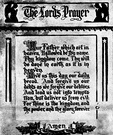

22 Many will say to me on that day, ‘Lord, Lord, did we not prophesy in your name, and in your name drive out demons and perform many miracles?’ 23 Then I will tell them plainly, ‘I never knew you. Away from me, you evildoers!’ (Matthew 7:15-21)
EXPOSITION:
Note, A man may be a preacher, may have gifts for the ministry, and an external call to it, and perhaps some success in it, and yet be a wicked man; may help others to heaven, and yet come short himself.......This should be an awakening word to all Christians. If a preacher, one that cast out devils, and wrought miracles, be disowned of Christ for working iniquity; what will become of us, if we be found such? And if we be such, we shall certainly be found such. At God’s bar, a profession of religion will not bear out any man in the practice and indulgence of sin; therefore let every one that names the name of Christ, depart from all iniquity. (Henry, Matthew, Matthew Henry’s Commentary on the Bible, (Peabody, MA: Hendrickson Publishers) 1997.)
TESTIMONY:
As we saw last week, there are a good number of passages warning about imposters in ministry. Likewise, there are also many ordinary people in the church who proclaim themselves to be followers of Jesus, who really aren't. The tares will be separated from the wheat in due course.
Today's message is a warning. Be careful who you allow to influence your walk with Jesus. Do they truly 'practice what they preach?' If you don't know, it is safer not to follow their leading.
There is a problem with big ministries. Of necessity, the leaders are so far removed from the people, that it is just about impossible to check them out. We see many leaders being exposed at the present time, which comes with tremendous hurt and damage to the people, numbers of whom will never grace a church again, and may well throw away their faith.
Beware of the spiritual 'super salesman', who will likely look good, perhaps with a 'trophy wife', who likes to acquire the good things of the world rather than sacrifice the material in order to seek and find the spiritual. Most prosperity preachers fall into this category.
Secondly, be careful not to confuse anointing with godliness. I say this not from a position of jealousy, but as a caution from one who has been blessed with an anointing. Most times I speak, the Holy Spirit will come in power at some time during a series of meetings. It amazed me the first time it happened and has continued to surprise me ever since, for I do nothing. He simply turns up.
With the criticism I took the first time it happened, I went into depression for several months which killed any more public ministry for several years. When I did start speaking again, I did not know what would happen, but the Spirit again turned up, and I was, through having gone to hell and back (figuratively speaking!), so deepening my relationship with Jesus, better able to handle the situation.
For the past 3 1/2 years I have not done any public speaking, as our efforts have centered around setting up our second hand clothing business, Seekers Megamarts. However, as we become established, I sense that the time may be coming nearer when some speaking will return. Will the Holy Spirit turn up then? I don't know for sure, but feel it highly likely He will. But I take nothing for granted!
You see, anointing is given, and often remains, even when the receiver walks away from the Lord. And the temptations for anointed people to walk away are great, for satan is continually on your case! From personal experience, do not pray to receive anointing unless you are prepared to pay the price! I never did pray to get it, but God still gave it, for I guess He knew me better than I know myself. Like everything in God, the greater the blessing, the greater the cost. We all want the blessings, but are we really prepared to price of receiving them?
But I digress.......
While anointing may be a sign of one to listen to, it may not be, also. Note that I didn't say 'to follow'. For the only one we are to follow is Jesus! We may learn from a person, but we are only to follow Jesus. If our spiritual life is built upon the leadership of a human being, we are not 'walking in The Way'. Our primary relationship must be with Jesus. We are to get to know Him through reading The Word for ourselves until, through the guidance of the Holy Spirit, Jesus becomes part of us, and we, part of Him. No man, no woman, can be a 'Jesus substitute' in our lives. Yes, we need good mentors. But most of all, we need Jesus!
As leaders, only relationship with Jesus will stop us from going astray. As followers, may we follow Jesus, not a person.
The church age has encouraged us to follow leadership, but in the coming kingdom age, in the final days, our attention and focus is to be upon Jesus. For it is only He who can turn the church into the pure white bride for whom He is to return.
Revelation 19:7-8








